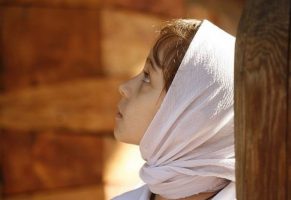In an American guidebook for religious youth instructors I happened to read several pieces of advice on how to conduct the matter. I would not say that this advice was satisfactory. They say: teach the children to notice the presence of God in all the circumstances of their everyday life, both at home and at school, and you can help them keep their faith. This is not always so. Children who have faith undoubtedly see the presence of God in their everyday life, but, unfortunately, this does not prevent them from losing their faith as they get older, and that which in their childhood they saw as having been evidently influenced by God, in their teen years appears to them in a different light, and they begin to look upon their childhood faith as a na?ve delusion. Ideas which in childhood seemed well-founded and convincing, no longer satisfy the adult. Once, when I was 11-12 years old, I was unable to solve a difficult math problem. In vain I sat the whole evening, trying to solve it. As I went to bed, I prayed to God to help me solve the problem. During the night I saw the solution in my dreams, and when I got up in the morning, I joyfully wrote it down, with my heart full of gratitude to God, Whose help I did not doubt. However, when I turned seventeen, this childhood experience did not prevent me from considering myself an unbeliever, and I explained the occurrence by a subconscious effort on the part of my relaxed brain.
This example shows that our childhood conclusions concerning the participation of God in our lives in no way guarantee the preservation of our faith in adulthood. Young people in general regard everything with great skepticism, especially that which is presented to them by older people as an unarguable and concrete truth.
They say: read the Bible to the children, the Bible will teach them to know God.
Undoubtedly the word of God, heard in childhood, leaves its trace in the soul and bears fruit in its own time. However, in this case, too, it is not the validity of Biblical truths which is significant to the mind, but a deeper transformation of the heart which occurs under the influence of the word of God. If the Bible remains only in the mind and in the memory, it will not help preserve a child’s faith.
Biblical stories, which are heard and accepted with total trust in childhood, in teenage years, particularly under the influence of negative scientific criticism and prevalent beliefs in society – evoke disbelief and denial. One must have a deep and unshakeable faith in the Bible as the genuine word of God, in order not to lose a pious attitude towards it, and even professional theologians, as we know, often lack such a faith.
The same can be said about reading lives of the saints. Lives of the saints can naturally encourage us by their example of Christian striving, but we must look upon these saints not only as heroes of olden times and exceptional circumstances, but as our eternal companions, instructors and helpers, as living members of the Church, with whom we can be in constant contact and to whom we can appeal with prayers for help. In other words, the remembrance of saints gives us real help only when we live a full Christian life, when we live within the Church in an indivisible unity with the saints, when the saints are more than just historical figures of the past for us.
All these aforementioned methods of influencing young people suffer from the same basic shortcoming – they skim the surface, they appeal primarily to reason and do not apply themselves to the internal condition of a child’s soul, which has already begun to deteriorate under the influence of sin.
In order to offer real and effective help with religious life, it is imperative to analyze this internal spiritual process which takes place in the young soul and which leads it to religious desolation. Only by understanding this process in each individual case may the solution be realized.
The most important aspect of this process is the development of a sinful frame of mind, enclosed upon itself. This is what one must struggle against, and not appeal only to mind with arguments of a general nature.
Both the loss of faith and the return to it never occur through a calm, theoretical, exclusively reasonable process. The loss of faith and the return to it usually constitute a heavy internal drama, extremely painful, sometimes leading to despair, to a wish for death, and this drama sometimes lasts for many years.
It is impossible to heal the internal condition only with words and pious instructions or learned lectures.
Against the painful process of internal disintegration one must set up another, creative process of internal amelioration by having the soul influenced by a healthy, positive, creative force.
The most important concern in religious education is to make sure that not only in a child’s conscience, not only in his memory and habits, but in the deepest part of his soul a contact with God is preserved. This inner contact with God must be the bulwark against which all the temptations of sensuality and proud self-delusion will be shattered.
The child may be helped in this matter first of all by a favorable environment of active religious faith and love for God. As a candle is lit from a flaming candle, so in a child’s soul the flame of faith and love is lit not from precepts and rules, but from a surrounding spirit of faith and love.
Of primary and most important significance in the religious life of children is, of course, the family. But this family must be, in the words of Apostle Paul, a small home church, i.e. not be only officially counted as an Orthodox unit, not be limited only to an external observance of church rules, but to truly retain the Lord Jesus Christ as the focal point of its life.
Only under such a condition will the atmosphere of the Orthodox home and the entire mode of family life penetrate deep into the child’s soul.
Then a mother’s or a father’s prayer, an icon or a cross over the crib and the bed, the partaking of Holy Communion, the sprinkling with holy water, the lampada lit before an icon – all will not just be an empty external manifestation, but rather the expression of the family’s genuine religious spirit, and as such will not evince contradictions and doubts in the child’s soul.
In the presence of complete unity between the spirit and form of the family’s religious life, as a sponge soaks up water, so will the child’s soul soak up the impressions of an Orthodox family’s way of life.
The family’s religious traditions, the celebration of Christmas, Epiphany or Easter, the Pentecost or the Great Lent – all of this does not disappear without a trace in the child’s religious life. Out of all of this the soul amasses a reserve of holy impressions, of joyous and pure experiences, which form the foundation of the future conscious religious life. In years to come, during moments of danger, of inner crises, these impressions, this childish religious experience rises to the surface of the soul and becomes the source of salvation and renewal.
The benevolent effect of a religious Orthodox family is immeasurable – unnoticeably, organically, lightly and freely it lays in the child’s soul the foundations of a healthy religious life.
The second environment, even more necessary to proper religious development, which comprises the Orthodox family itself – is the Orthodox Church, whose focal point is the Lord Jesus Christ. The soul of the Orthodox child must be strengthened with the realization that not only is he part of an Orthodox family, but part of the Orthodox Church, with whom he is organically and eternally united, and which is his spiritual nurturer and educator.
Such a feeling easily arises in the child’s soul if his surrounding family lives with this feeling. The feeling of belonging to the Church is more important than the feeling of belonging to the family. The family may be destroyed, but the Church – never. The one who is conscious of being a member of the Church will never feel alone in the world: he will always be held in God’s strong hands. He will always feel an indestructible foundation under his feet. He will always live in constant communion with Christ, with the saints and with the souls of the departed.
The strengthening of such a realization in the child is a highly important task of religious education.




















